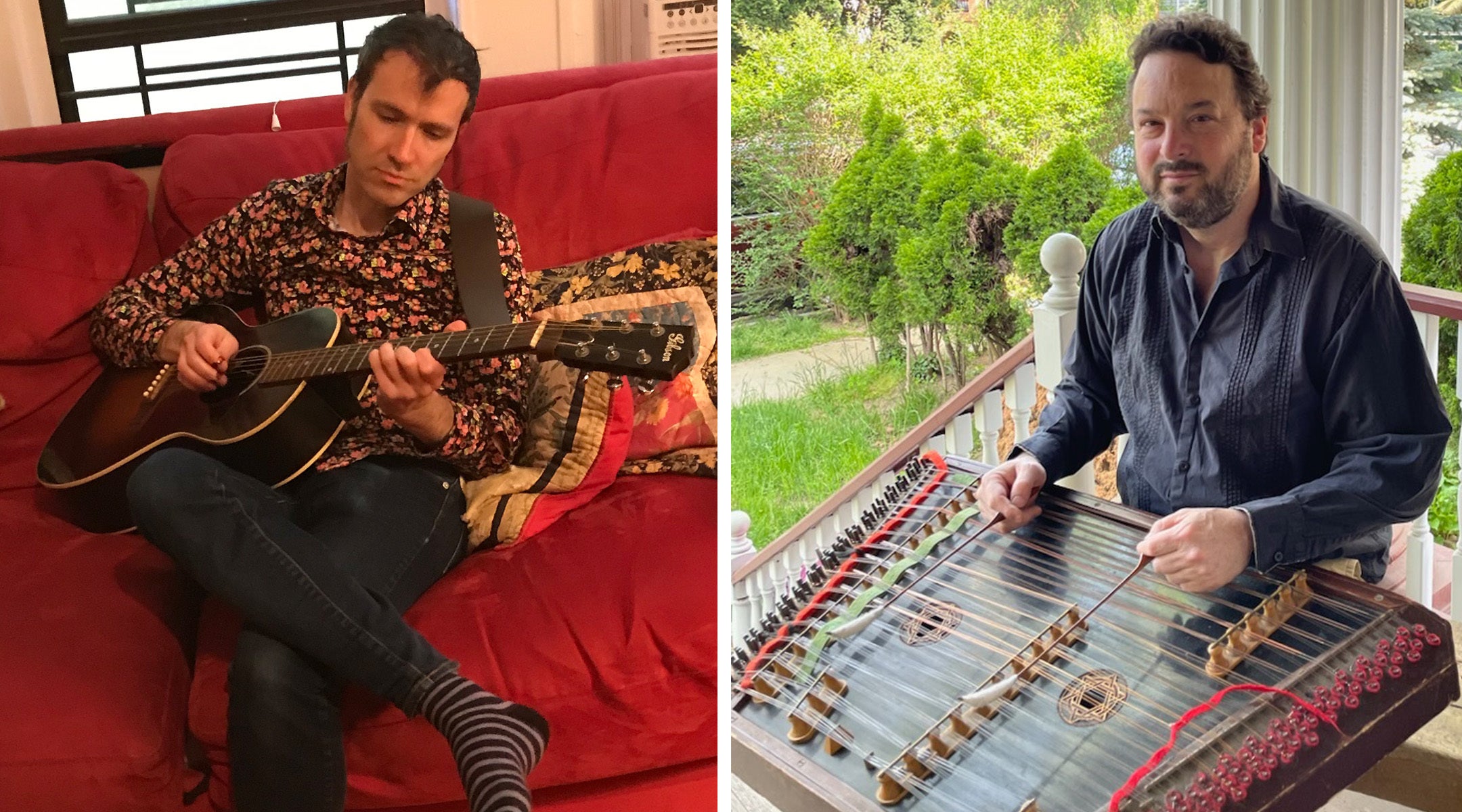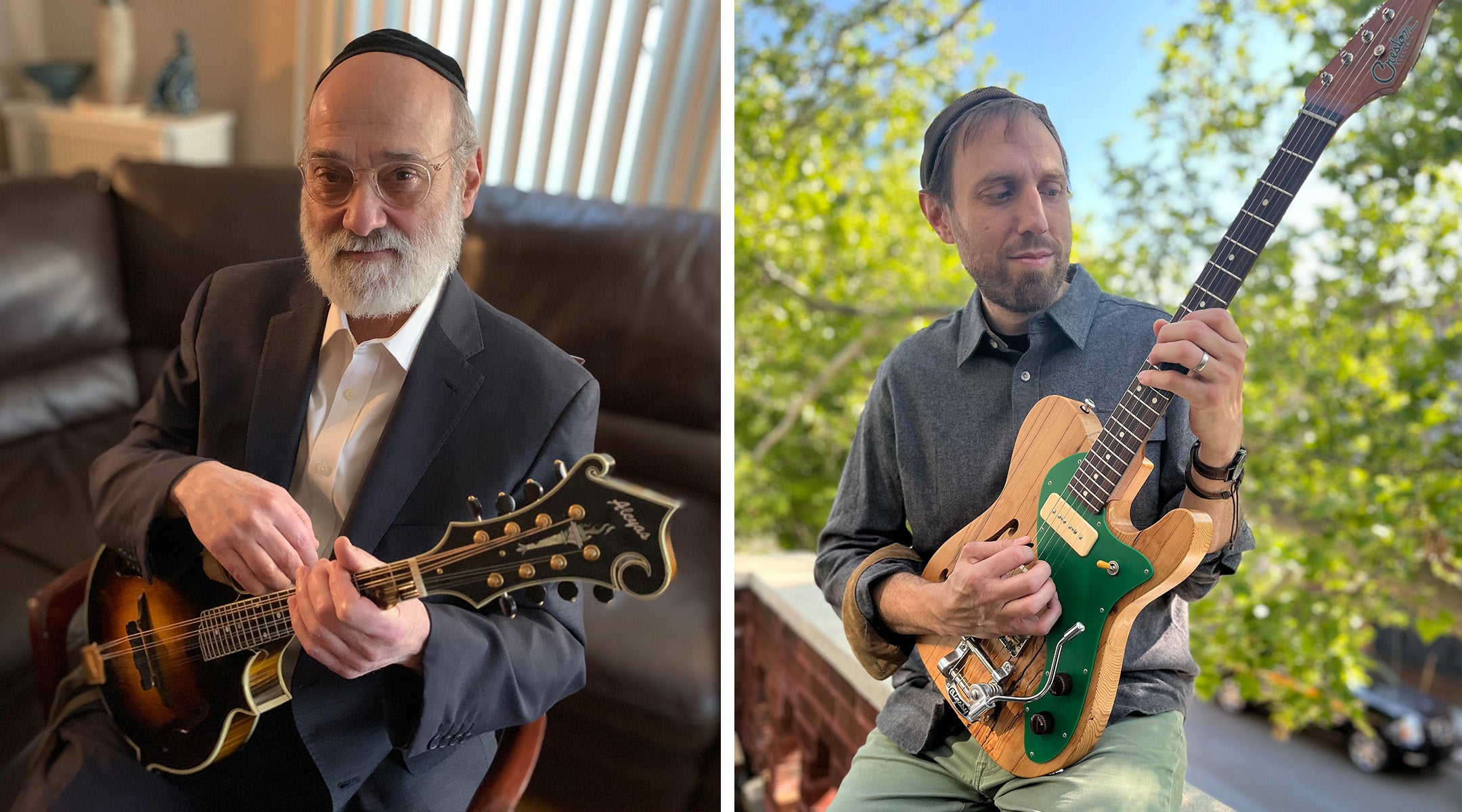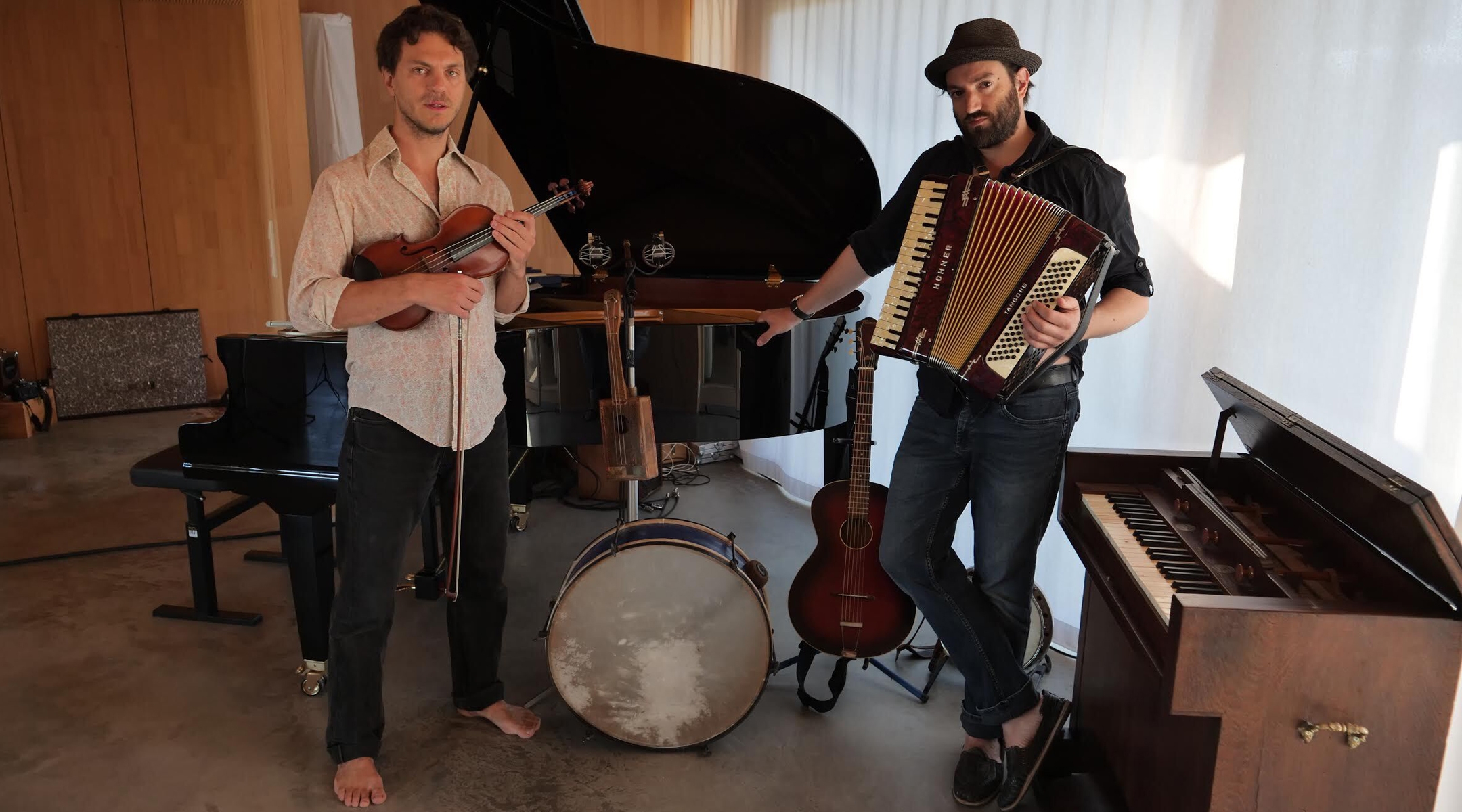(New York Jewish Week) — Some of the greatest talents in Jewish music have strolled Midwood’s lettered avenues, including the klezmer musician Pete Sokolow and the Hasidic composer Ben Zion Shenker. Both have left us — Sokolow in 2022, Shenker in 2016 — but the Modzitzer synagogue on Avenue L, where Shenker once lead prayers, is a spiritual home for klezmer virtuoso and Midwood denizen Andy Statman, 73. He’s davened (prayed) there for more than 30 years.
Now, a younger group of klezmer musicians joins Statman in making the quiet, south-central Brooklyn neighborhood their home, due to the (relatively) affordable rents, low density and greenery, as well as its proximity to Jewish communal life spread across the borough.
“We needed more room than Park Slope could provide on our budget,” Pete Rushefsky, who has played a hammered dulcimer known as the tsimbl in the city’s klezmer scene for more than 30 years, told the New York Jewish Week. “It’s been a great neighborhood to raise a family.” That’s especially true for a culturally active family: Rushefsky’s wife, Madeline Solomon, sings, plays accordion and runs the Brooklyn Workers Circle School in Park Slope; their 12-year-old daughter, Mathilda, plays in a children’s fiddle band in the neighborhood.
Midwood looms so large over the present-day Jewish music scene that there’s even a klezmer rock band named for it: Midwood, the band, was founded in 2015 by the fiddler Jake Shulman-Ment. The 39-year-old veteran klezmer violinist lives in the same apartment building on Ocean Avenue as Jeremiah Lockwood, a blues performer and a scholar of cantorial music.
“I call it the ‘Klezmer Shtetl,’” said Midwood’s vocalist, Eleonore Weill, who is also a multi-instrumentalist. (Weill used to reside in Midwood but now lives in next-door Ditmas Park, which is also home to Sarah Gordon, lead singer of the rock band Yiddish Princess. Nearby Kensington counts among its klezmer-making residents D. Zisl Slepovitch and the klezmer couple Ilya Shneyveys and Sarah Myerson.)
Another Midwood musician is Michael Winograd, 40, who many consider to be the best klezmer clarinetist of his generation. As a teenager, he went to Statman’s home for lessons; last summer he moved to the neighborhood.

Midwood musicians Jeremiah Lockwood, left, and Pete Rushefsky. (Courtesy)
Elsewhere in Midwood resides guitarist Yoshie Fruchter, founder of Pitom, which the Tzadik record label called “a shredding Jewish instrumental band.” Fruchter has performed with Jon Madof’s Zion80, which plays Shlomo Carlebach tunes in an Afrobeat style, and Mazal Tov Cocktail Party, the latest klezmer/dance music project led by David Krakauer and Kathleen Tagg.
“I didn’t choose Midwood, particularly,” Shulman-Ment told New York Jewish Week. “It sort of fell into my life.” The fiddler decided to rent his Midwood one-bedroom in the summer of 2021 while he was on tour in the Pacific Northwest. After seeing the place online and sending a couple of friends to check it out in person, Shulman-Ment signed a lease while he was still on the road.
As it happens, Lockwood — who lives with his two sons, ages 14 and 16, on the floor below Shulman-Ment — also rented his apartment sight unseen that same summer.
The two neighbors credit Ivona Hertz, co-owner of Ocean Empire Management, with helping them find a home. Her company manages a pair of buildings across from Prospect Park that are home to so many jazz musicians, they came to be known as “the jazz dorms.”
“When the tenants are happy they always recommend their friends,” Hertz said, describing how she came to rent Midwood apartments to so many musicians. “That’s how the ‘jazz dorms’ were created and that’s how the Midwood buildings are now getting more musicians. The apartments are larger, up to three bedrooms, including the square footage, and more affordable in Midwood.”
According to the available rentals on the real estate website StreetEasy, the median rent in Midwood is $2,566. (Hertz, the property manager known for helping musicians, says she typically charges between $1,500 and $1,750 a month for one-bedroom rentals.) The median sale price in the nabe for the first quarter of this year was $644,000, according to the real estate website PropertyShark — that’s substantially less than the Brooklyn borough-wide median of $755,000.
In addition to relatively low housing costs, Midwood is also known for being home to a very large — and mostly Orthodox — Jewish community. Traditionally Ashkenazi, the southern reaches of the neighborhood have also seen steady growth of its longtime Sephardic Jewish community. “Sephardic Jews dominate from [an area known as the] Avenue H cut to Avenue Z,” Sarina Roffe, CEO of the The Brooklyn Jewish Historical Initiative and president of the Sephardic Heritage Project, told the New York Jewish Week. “The Sephardic community in Brooklyn has been growing for more than 100 years.”
Most of these newer, klezmer residents identify as secular Jews, and not Orthodox. But many of them said they enjoy living among their Orthodox brethren. Clarinetist Winograd lives in part of Midwood that’s “very Jewish,” as he described it. “I kind of like being a secular Jew who gets to experience the benefit of a quiet Shabbes. I enjoy being a culturally-engaged Jew living in a Jewish neighborhood even if I’m not partaking in the more religious activities.”
Shulman-Ment — who identifies as a secular Jew who is committed to Jewish culture — spent a year living in Crown Heights, so he was familiar with the feeling of living in an Orthodox neighborhood and feeling like a bit of an outsider. He said he’s noticed, though, that if he’s in his “gig costume” — a suit and fedora — some of his Orthodox co-religionists offer a friendly greeting.
Lockwood described his (and Shulman-Ment’s) section of Midwood, along Ocean Avenue, as “rough-hewn and unlovely. It is a hard-working and threadbare place.” And yet, “I like it here fine,” he told the New York Jewish Week, adding: “I just don’t want to encourage out-of-towners to move in.”
Fruchter — who moved to Midwood last December with his wife, Jewish cookbook author Leah Koenig, and their two kids, aged 4 and 9 — said his area of Midwood has a lot of Pakistani residents, but on Saturday his family can often hear zemiros, hymns sung at the Sabbath table, coming from the homes of Orthodox neighbors down the block. “I really like how you see people from so many different places, cultures, religions and backgrounds all sharing the same sidewalks,” Fruchter told the New York Jewish Week via email. “I love walking by businesses with signs in different languages and restaurants where I have no idea what to order… I love that it’s a ‘quiet’ neighborhood but with a lot of bustle in it.”

Klezmer virtuoso Andy Statman, left, has lived in the neighborhood more than 30 years, while guitarist Yoshie Fruchter, right, is a more recent resident. (Courtesy)
The family is involved in the Flatbush Jewish Center, a Conservative egalitarian synagogue in the neighboring Kensington section of Brooklyn where Fruchter has served as cantor on the High Holy Days and organized a concert series.
Fruchter is also a member of Shulman-Ment’s band Midwood — whose recording of their live performance at the “Klezmer On Ice” festival in Minneapolis last winter will be released in the coming months. Midwood the band’s next gig is at the National Yiddish Book Center’s annual Yidstock festival in Amherst, Massachusetts on July 16.
Shulman-Ment will also be performing with the actor and musician Daniel Kahn on June 15 at the East Village world music venue Drom. The performance is timed to the release of the duo’s first album, “The Building & Other Songs,” which features Yiddish versions of songs by Leonard Cohen, Bruce Springsteen, Tom Waits and Woody Guthrie.
The other Midwood klezmer musicians with gigs to look forward to are Rushefsky — who is also the executive director of the Center for Traditional Music and Dance — and Statman, who will both be playing with the violinist Itzhak Perlman in the coming months.
In addition, Statman plays in two trios: The Andy Statman Trio, which has performed at the Greenwich Village Synagogue in Manhattan regularly for 20 years, and another with the Eddy Brothers, two young West Virginia bluegrass musicians. More recently, Statman started playing with a traditional bluegrass quartet that’s comprised of players he’s known since he was a teenager. That band is now known as Andy’s Ramble, not to be confused with the 1994 Statman album of the same name.
Statman grew up in Queens and was in his mid-20s when he first moved to Brooklyn in 1976. After a series of apartments, he and his wife Basha moved to Avenue L in Midwood in 1987, where they raised their four children. “Our kids needed to be here. We needed to be here,” Statman said. “There is sky and trees and grass here. There are birds chirping all over. The neighborhood was incredibly vibrant.”
When he first arrived, Statman took a break from his music career for a year to study Jewish holy texts full time. In the 35 years since, he’s seen real estate values soar to a level he calls “ridiculous.” Statman said that since the early 2000s, he’s watched kids who grew up on his block move to Lakewood, New Jersey or Monsey in Rockland County — both home to sizable Orthodox Jewish communities — because they couldn’t afford to buy homes in Midwood. Now their parents are leaving, he added, because they want to be near their grandchildren.
It’s a fate the clarinetist is personally familiar with: None of his four children, now grown, live in the area. With two daughters and their grandchildren living near Lakewood, the Statmans are considering relocating there themselves.
The New York Jewish Week brings you the stories behind the headlines, keeping you connected to Jewish life in New York. Help sustain the reporting you trust by donating today.





